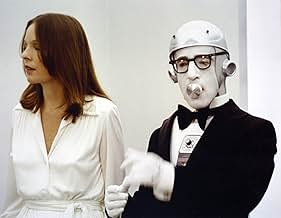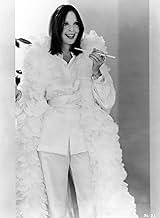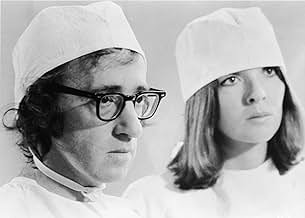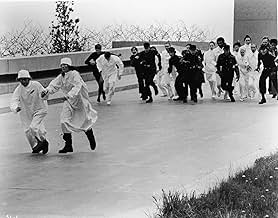AVALIAÇÃO DA IMDb
7,1/10
46 mil
SUA AVALIAÇÃO
O dono de uma loja nerd é revivido da criostase em um mundo futuro, para lutar contra um governo opressor.O dono de uma loja nerd é revivido da criostase em um mundo futuro, para lutar contra um governo opressor.O dono de uma loja nerd é revivido da criostase em um mundo futuro, para lutar contra um governo opressor.
- Prêmios
- 2 vitórias e 2 indicações no total
Mews Small
- Dr. Nero
- (as Marya Small)
Stanley Ralph Ross
- Sears Swiggles
- (as Stanley Ross)
John Cannon
- Various Voice-Overs
- (narração)
- (não creditado)
Myron Cohen
- Robot Tailor
- (não creditado)
- Direção
- Roteiristas
- Elenco e equipe completos
- Produção, bilheteria e muito mais no IMDbPro
Avaliações em destaque
Miles Monroe (director Allen), a health food store owner and jazz clarinetist, goes to a hospital for a routine operation, but something goes wrong and he is put to cryogenic sleep for over 200 years. When he is woken up in the 22nd century, the society has changed into a pleasure-addicted dictatorship. Miles is immediately pulled into revolutionary activity and soon has to flee the state police on his way to the mysterious ruler of the society. He also finds himself teaming up with an initially reluctant woman called Luna (Diane Keaton) and together they adventure through the futuristic society.
The comedic style of Sleeper is an entertaining combination of over-the-top farce and Allen's usual verbal jabs at the society of the 20th century. The silly jazz music accompanying the bumbling chase scenes evokes memories from the silent era (some scenes are even sped-up), and the old masters of slapstick have clearly been a major influence to the style. There are also many references to more modern works of science fiction, such as 2001: A Space Odyssey and Nineteen Eight-Four. Besides the funny farcical scenes, Allen gets to perform his classic neurotic worrying routine that works fine and will amuse fans of his on-screen persona.
A very notable aspect of the film is its visual style: the sets and props all look excellent. The futuristic houses, round vehicles, stiff servant robots, gigantic fruits and even an unruly pudding look hilarious and the many details of the society provide chances to comment on how things are advancing in our times. Be it an orgasm-machine or nonsensical poetry, they seem to suggest we are moving towards times where ignorance revels and empty pleasure-hunting is celebrated as the only correct form of bliss; it can be said that the underlying themes of Sleeper are not unlike those of Aldous Huxley's classic novel Brave New World.
Social commentary aside, Sleeper is also a very funny comedy that appeals not only to friends of Allen's neurotic shtick but also to slapstick fans and admirers of creative production design. Diane Keaton also deserves praise for her performance that features all the necessary comical energy and makes a good pairing for the protagonist Miles. In brief, I laughed out loud several times and would rank the film highly among the handful of Allen films I've seen so far. As far as sci-fi comedies go, Sleeper is a definite winner.
The comedic style of Sleeper is an entertaining combination of over-the-top farce and Allen's usual verbal jabs at the society of the 20th century. The silly jazz music accompanying the bumbling chase scenes evokes memories from the silent era (some scenes are even sped-up), and the old masters of slapstick have clearly been a major influence to the style. There are also many references to more modern works of science fiction, such as 2001: A Space Odyssey and Nineteen Eight-Four. Besides the funny farcical scenes, Allen gets to perform his classic neurotic worrying routine that works fine and will amuse fans of his on-screen persona.
A very notable aspect of the film is its visual style: the sets and props all look excellent. The futuristic houses, round vehicles, stiff servant robots, gigantic fruits and even an unruly pudding look hilarious and the many details of the society provide chances to comment on how things are advancing in our times. Be it an orgasm-machine or nonsensical poetry, they seem to suggest we are moving towards times where ignorance revels and empty pleasure-hunting is celebrated as the only correct form of bliss; it can be said that the underlying themes of Sleeper are not unlike those of Aldous Huxley's classic novel Brave New World.
Social commentary aside, Sleeper is also a very funny comedy that appeals not only to friends of Allen's neurotic shtick but also to slapstick fans and admirers of creative production design. Diane Keaton also deserves praise for her performance that features all the necessary comical energy and makes a good pairing for the protagonist Miles. In brief, I laughed out loud several times and would rank the film highly among the handful of Allen films I've seen so far. As far as sci-fi comedies go, Sleeper is a definite winner.
Before he became a "serious" filmmaker and gained the respect and admiration of film critics, Woody Allen was already entertaining millions of fans with such unashamedly silly comedies as 1973's 'Sleeper.' The science-fiction story concerns an unfortunate Miles Monroe (Allen), the 1970s owner of the Happy Carrot health-food store, who goes into St. Vincent's Hospital for a routine peptic ulcer operation and wakes up 200 years later in a terrifying police state. He is revived by a subversive underground rebel organisation to help uncover the secrets of the dreaded "Aries Project," and to overthrow the tyrannical government and its dictator. Along the way, Miles enlists the help of the neurotic and exuberant Luna Schlosser (Diane Keaton, who collaborated with Allen on multiple occasions, most notably in 'Annie Hall (1977)' and 'Manhattan (1979)').
A chaotic blend of razor-sharp satire and slapstick humour, 'Sleeper' contains enough of Allen's and co-writer Marshall Brickmann's trademark wit to remind us of what makes their later collaborations so brilliant. Of course, as Allen had yet to reach his creative peak, some of the jokes in the film work (the infamous Orgasmatron; the Volkswagen Beetle that starts up immediately after 200 years of neglect), whilst others aren't pulled off quite so well (the giant chicken; the mock Miss America pageant). In one memorable sequence, year 2173 historians show Miles a collection of historical items and photographs, and he idly gives off ridiculous explanations which they accept as fact. For example, yes, Howard Cosell's sporting reports were used as punishment for criminals who had committed a crime against the state!
The promotional posters for the film proclaimed: "Woody Allen Takes A Nostalgic Look At The Future." This, more than likely, refers to the style of comedy, which, aside from Allen's witty observations, very much evokes memories of the silent slapstick comedies of Lloyd, Keaton and Chaplin. Much like the latter did with most of his films, Allen wrote, directed, starred in and composed the score for 'Sleeper.' The score itself, which is very upbeat, New Orleans-style traditional jazz, was performed by the Preservation Hall Jazz Band with Allen sitting in on clarinet. 'Sleeper' may have been inspired by H.G. Wells' classic novel, 'The Sleeper Awakes,' which recounts the tale of a man who awakes from a 203-year sleep to find himself in a horrifyingly-transformed futuristic London.
Aside from including a wealth of instantly-quotable one-liners ("I'm not really the heroic type. I was beat up by Quakers"), Allen also has a lot of fun in his disorganised futuristic dystopia. After pouring too much "Instant Pudding" into a bowl, the overdone dessert practically comes to life and has to be beaten into submission with a broom; it is also revealed that, contrary to popular agreement in 1973, such substances as deep fat, tobacco and hot fudge are not only not unhealthy, but probably the best thing for your body! When Miles happens upon a garden of human-size fruit and vegetables, we just know that the giant banana peel is going to come into play somewhere, and, sure enough, Miles inevitably takes a tumble.
A chaotic blend of razor-sharp satire and slapstick humour, 'Sleeper' contains enough of Allen's and co-writer Marshall Brickmann's trademark wit to remind us of what makes their later collaborations so brilliant. Of course, as Allen had yet to reach his creative peak, some of the jokes in the film work (the infamous Orgasmatron; the Volkswagen Beetle that starts up immediately after 200 years of neglect), whilst others aren't pulled off quite so well (the giant chicken; the mock Miss America pageant). In one memorable sequence, year 2173 historians show Miles a collection of historical items and photographs, and he idly gives off ridiculous explanations which they accept as fact. For example, yes, Howard Cosell's sporting reports were used as punishment for criminals who had committed a crime against the state!
The promotional posters for the film proclaimed: "Woody Allen Takes A Nostalgic Look At The Future." This, more than likely, refers to the style of comedy, which, aside from Allen's witty observations, very much evokes memories of the silent slapstick comedies of Lloyd, Keaton and Chaplin. Much like the latter did with most of his films, Allen wrote, directed, starred in and composed the score for 'Sleeper.' The score itself, which is very upbeat, New Orleans-style traditional jazz, was performed by the Preservation Hall Jazz Band with Allen sitting in on clarinet. 'Sleeper' may have been inspired by H.G. Wells' classic novel, 'The Sleeper Awakes,' which recounts the tale of a man who awakes from a 203-year sleep to find himself in a horrifyingly-transformed futuristic London.
Aside from including a wealth of instantly-quotable one-liners ("I'm not really the heroic type. I was beat up by Quakers"), Allen also has a lot of fun in his disorganised futuristic dystopia. After pouring too much "Instant Pudding" into a bowl, the overdone dessert practically comes to life and has to be beaten into submission with a broom; it is also revealed that, contrary to popular agreement in 1973, such substances as deep fat, tobacco and hot fudge are not only not unhealthy, but probably the best thing for your body! When Miles happens upon a garden of human-size fruit and vegetables, we just know that the giant banana peel is going to come into play somewhere, and, sure enough, Miles inevitably takes a tumble.
A futuristic comedy from Woody Allen in 1973 has him waking up from an operation 200 years later (in 2173) to find society has gone berserk.
Clever, witty, and very funny. Allen is hysterically funny as the "sleeper" who gets to give history lessons on the 1970s, pose as a robot, and become a revolutionary to be near Diane Keaton.
Filled with sight gags galore and great one-liners. The giant vegetables and chicken are funny. And so is the "1984" political humor that fits the Bush era better than it did the Nixon era. Also very funny is Allen's extended Blanche du Bois speech.
Allen is excellent as is Keaton. John Beck plays a revolutionary. Mary Gregory is the doctor. George Furth is a party guest. Jackie Mason does the voice of the Jewish tailor.
A must see.
Clever, witty, and very funny. Allen is hysterically funny as the "sleeper" who gets to give history lessons on the 1970s, pose as a robot, and become a revolutionary to be near Diane Keaton.
Filled with sight gags galore and great one-liners. The giant vegetables and chicken are funny. And so is the "1984" political humor that fits the Bush era better than it did the Nixon era. Also very funny is Allen's extended Blanche du Bois speech.
Allen is excellent as is Keaton. John Beck plays a revolutionary. Mary Gregory is the doctor. George Furth is a party guest. Jackie Mason does the voice of the Jewish tailor.
A must see.
Sleeper was a very interesting project for Allen. He had spent time doing stand up, and up until this, his movies had been written around the jokes. With the exception of Play it Again, Sam, they were a series of sketches loosely tied into a weak plot. Sleeper was the beginning of the end of this. While the plot is somewhat "sit-com-ish", it was still there, and viewers always kept it in mind. It was also loose enough that Allen could incorporate scenes paying homage to the early silent film stars (the scene with the flying suits is my personal favorite). Miles Monroe was also a rip off from Bob Hope's cowardly hero personalities, but Allen gave it his own twist, and, in my opinion, made it much better. All in all, Allen achieved the perfect blend of slapstick and substance for those in need of a simple comedy. It lacks the depth of some of his better films, but if you want to laugh, this is for you.
Oh, and if you find it somewhat intellectually devoid, try Love and Death. It was his next film, and he added less slapstick and more highbrow comedy, as well as a little more real drama and substance.
Oh, and if you find it somewhat intellectually devoid, try Love and Death. It was his next film, and he added less slapstick and more highbrow comedy, as well as a little more real drama and substance.
In this early comedy, Woody Allen plays Miles Monroe, a twentieth century healthfood restaurant owner and jazz clarinettist who is cryogenically frozen after surgery and awoken two centuries later. The America of 2173 is a totalitarian state ruled by an oppressive dictator, and Miles has been reanimated by a group of rebels fighting to overthrow the government. For reasons too complex to set out here, Miles is forced to go on the run disguised as a robot and finds himself falling in love with his new owner, an attractive but intellectually vacant young woman named Luna. The film recounts how Miles wins Luna over to the rebel cause and tells the story of their fight against the regime.
Unlike some of Woody's later films, this is a pure comedy. It does not try to explore philosophical issues or to analyse the human condition in the same way as, say, "Hannah and her Sisters" or "Crimes and Misdemeanours". Although I normally think of Woody as a master of verbal wit, much of the humour in "Sleeper" is physical slapstick, based upon (and no doubt deliberate homage to) the comedians of the silent era such as Charlie Chaplin or Buster Keaton. (I particularly liked the scenes where Woody is disguised as a robot and those where the villains are attempting to clone the dictator, killed in a bomb explosion, from his nose). The links with that era are reinforced by the musical score, composed by Woody himself, in a jazz/ragtime style reminiscent of the 1910s and 1920s. The sets, by contrast, are very futuristic, with the clinical glass-and-chromium look of many science-fiction films. The combination of a futuristic theme with a traditional style of comedy is doubtless why the film was advertised under the slogan "Woody Allen takes a nostalgic look at the future".
This is not, however, simply a pastiche of silent humour like the one Mel Brooks was to attempt a few years later in "Silent Movie". This being a Woody Allen film, there is also a good deal of verbal humour, particularly one-liners along the lines of "I haven't seen my analyst in 200 years. He was a strict Freudian. If I'd been going all this time, I'd probably almost be cured by now". (As that line suggests, Miles is the typical, neurotically insecure Woody Allen character). As is often the case with humorous science-fiction (such as Douglas Adams's "Hitchhiker" books), the humour is frequently used to make satirical points about twentieth-century society as seen from the viewpoint of an imagined future. Contemporary worries about our diet are neatly satirised by a joke about how the science of two hundred years hence has proved that fatty foods and smoking are actually beneficial to health whereas what we now think of as healthfoods are regarded as unhealthy. This joke has remained topical because anxiety about what we eat is, if anything,even greater today than it was in 1973. There is perhaps also a dig at seventies "radical chic" as the vacuous conformist Luna becomes an equally vacuous revolutionary. (The plot of "Sleeper" seems to owe something to another tongue-in-cheek science-fiction film from a few years earlier, "Barbarella", which also dealt with rebellion against a dictator and even featured similar "orgasmatron" machines; the star of that film, Jane Fonda, had by 1973 become Hollywood's most famous radical chic actress).
The humour of "Sleeper" is often directed against figures from the sixties and seventies- perhaps too much so, as this type of humour tends to date very quickly. Some of it is still funny (such as Diane Keaton's Marlon Brando impersonation), but some can now be difficult to understand, particularly for non-Americans. (I had no idea, for example, who Howard Cosell was- apparently he was a sports commentator). That is, however, a minor quibble. Overall, this is an entertaining film and, in places, very funny, combining successfully two very different styles of humour. 7/10
Unlike some of Woody's later films, this is a pure comedy. It does not try to explore philosophical issues or to analyse the human condition in the same way as, say, "Hannah and her Sisters" or "Crimes and Misdemeanours". Although I normally think of Woody as a master of verbal wit, much of the humour in "Sleeper" is physical slapstick, based upon (and no doubt deliberate homage to) the comedians of the silent era such as Charlie Chaplin or Buster Keaton. (I particularly liked the scenes where Woody is disguised as a robot and those where the villains are attempting to clone the dictator, killed in a bomb explosion, from his nose). The links with that era are reinforced by the musical score, composed by Woody himself, in a jazz/ragtime style reminiscent of the 1910s and 1920s. The sets, by contrast, are very futuristic, with the clinical glass-and-chromium look of many science-fiction films. The combination of a futuristic theme with a traditional style of comedy is doubtless why the film was advertised under the slogan "Woody Allen takes a nostalgic look at the future".
This is not, however, simply a pastiche of silent humour like the one Mel Brooks was to attempt a few years later in "Silent Movie". This being a Woody Allen film, there is also a good deal of verbal humour, particularly one-liners along the lines of "I haven't seen my analyst in 200 years. He was a strict Freudian. If I'd been going all this time, I'd probably almost be cured by now". (As that line suggests, Miles is the typical, neurotically insecure Woody Allen character). As is often the case with humorous science-fiction (such as Douglas Adams's "Hitchhiker" books), the humour is frequently used to make satirical points about twentieth-century society as seen from the viewpoint of an imagined future. Contemporary worries about our diet are neatly satirised by a joke about how the science of two hundred years hence has proved that fatty foods and smoking are actually beneficial to health whereas what we now think of as healthfoods are regarded as unhealthy. This joke has remained topical because anxiety about what we eat is, if anything,even greater today than it was in 1973. There is perhaps also a dig at seventies "radical chic" as the vacuous conformist Luna becomes an equally vacuous revolutionary. (The plot of "Sleeper" seems to owe something to another tongue-in-cheek science-fiction film from a few years earlier, "Barbarella", which also dealt with rebellion against a dictator and even featured similar "orgasmatron" machines; the star of that film, Jane Fonda, had by 1973 become Hollywood's most famous radical chic actress).
The humour of "Sleeper" is often directed against figures from the sixties and seventies- perhaps too much so, as this type of humour tends to date very quickly. Some of it is still funny (such as Diane Keaton's Marlon Brando impersonation), but some can now be difficult to understand, particularly for non-Americans. (I had no idea, for example, who Howard Cosell was- apparently he was a sports commentator). That is, however, a minor quibble. Overall, this is an entertaining film and, in places, very funny, combining successfully two very different styles of humour. 7/10
Você sabia?
- CuriosidadesWoody Allen originally intended the film to be three hours long and in two parts. The first part would have him in the present day, coping with life until his illness. And the second half would be the futuristic part. But United Artists rejected this concept.
- Erros de gravaçãoLuna's shoes change from high heels to flats when she crosses the lake on Miles' back (in the "raft" costume).
- Citações
Luna Schlosser: It's hard to believe that you haven't had sex for 200 years.
Miles Monroe: 204, if you count my marriage.
- ConexõesEdited into Intimate Portrait: Diane Keaton (2001)
- Trilhas sonorasTill We Meet Again
(1918) (uncredited)
Music by Richard A. Whiting
Lyrics by Ray Egan
Performed by Woody Allen
Principais escolhas
Faça login para avaliar e ver a lista de recomendações personalizadas
- How long is Sleeper?Fornecido pela Alexa
Detalhes
- Data de lançamento
- País de origem
- Idiomas
- Também conhecido como
- El dormilón
- Locações de filme
- Sculptured House - 24501 Ski Hill Drive, Golden, Colorado, EUA(mushroom shaped building, top of mountain on south side of I-70)
- Empresas de produção
- Consulte mais créditos da empresa na IMDbPro
Bilheteria
- Orçamento
- US$ 2.000.000 (estimativa)
- Faturamento bruto nos EUA e Canadá
- US$ 18.344.729
- Faturamento bruto mundial
- US$ 18.344.868
Contribua para esta página
Sugerir uma alteração ou adicionar conteúdo ausente


































